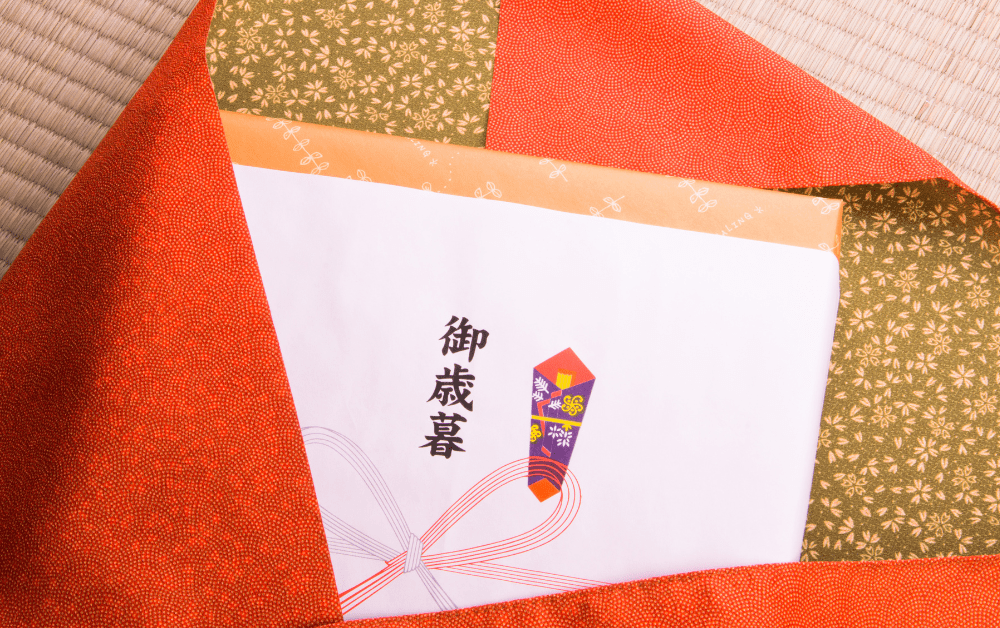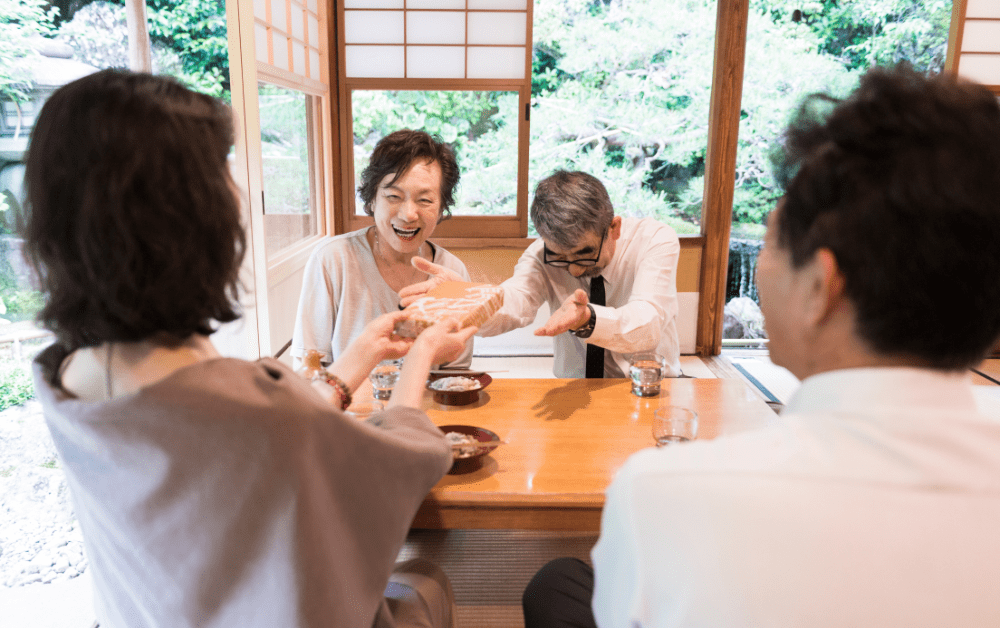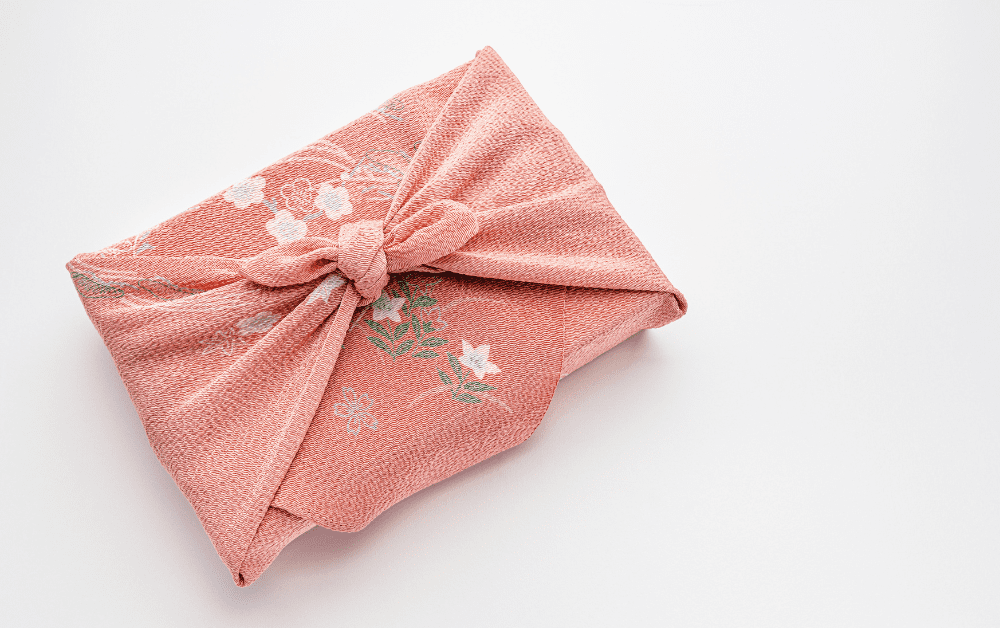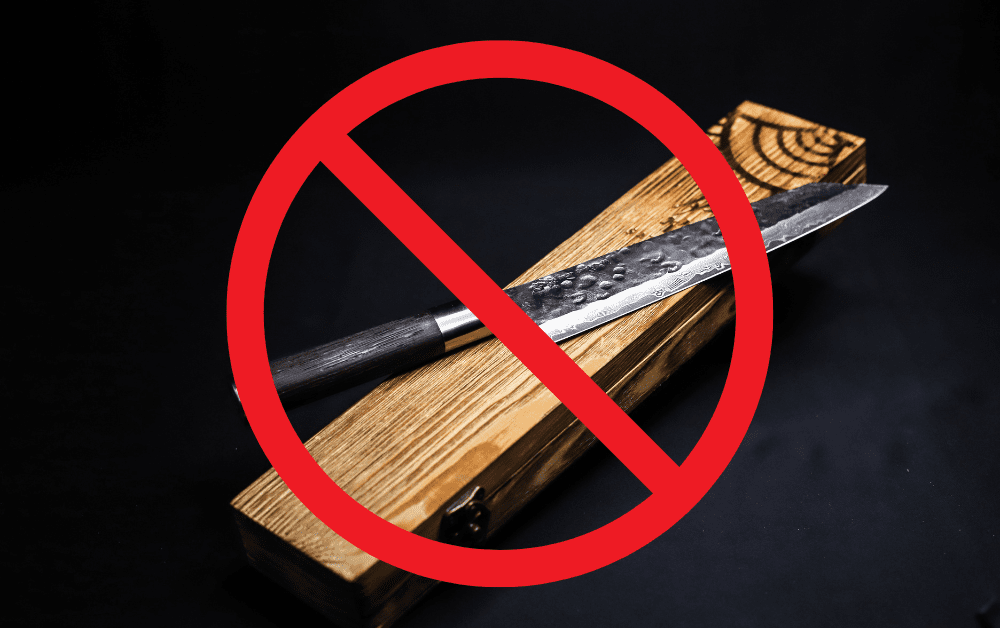Gift-giving in Japanese Culture is an inseparable part of the long lived culture, as it have deeply rooted in traditions and societal norms. It represents gratitude and respect and serves as a means of nurturing positive relationships.
Within the Japanese workplace, the concept of “お土産 (omiyage)” takes center stage, and understanding the nuances of gift-giving etiquette becomes essential for navigating the complex dynamics of this culture. Let’s delve into the 10 dos and don’ts of gift-giving in the Japanese workplace.
Jump to:
Do #1: Understand the Significance of お土産 (omiyage) Culture
Do #2: Consider the Appropriate Occasions for Gift-Giving in the Workplace
Do #3: Learn Japanese Phrases for Workplace Gift-Giving Etiquette
Don’t #1: Don’t Open Immediately and Receive Gracefully
Don’t #3: Mind Colors’ Symbolism
Do #1: Understand the Significance of お土産 (omiyage) Culture

While the term お土産 (omiyage) translates to “souvenir” in English, it embodies a much more profound sentiment in Japanese society. Both terms involve the idea of gift-giving, but they are distinct in their purpose, context and cultural implications.
Purpose and Context:
- Souvenir: In Western culture, a souvenir is often a token or memento that a person brings back from a trip or visit to a different place. It serves as a reminder of the experience and is often given as a casual gesture to share memories with loved ones.
- お土産 (omiyage): お土産 (omiyage) can serve a broader purpose that goes beyond personal memories. It is more than just exchanging physical items. It is a cultural practice that emphasizes the thoughtfulness behind the gift and the act of sharing, rather than just the item itself.
Recipients:
- Souvenirs are typically given to close friends and family members.
- お土産 (omiyage) is given to a wider range of people, including friends, coworkers, acquaintances and even neighbors. It is a practice of presenting small, thoughtful gifts to show consideration and strengthen various social connections.
Cultural Significance:
- While souvenirs are appreciated, they do not carry the same cultural weight as お土産 (omiyage) in Japan. They are less formal and do not always play a pivotal role in maintaining social relationships.
- お土産 (omiyage) is deeply embedded in Japanese gift-giving culture and is a crucial aspect of social interactions. Ignoring this practice could be seen as not being thoughtful or even disrespectful.
Do #2: Consider the Appropriate Occasions for Gift-Giving in the Workplace

Knowing when and how to give gifts in the workplace can be intricate, as it involves a delicate balance of timing and appropriateness. There are specific occasions when it is considered appropriate to give gifts in the workplace. お中元 (ochugen) and お歳暮 (oseibo) are two traditional gift-giving occasions in Japan. Here is when they are typically observed:
- お中元 (ochugen): Mid-Year Gift-Giving Tradition
お中元 (ochugen) is a traditional Japanese gift-giving custom that occurs during the summer months, usually around mid-July. Over time, お中元(ochugen) evolved into a way to show gratitude and maintain social connections by exchanging gifts. お中元 (ochugen) gifts are often given to clients, colleagues and superiors, and include food items that are enjoyed during the summer, such as seasonal fruits, sweets and traditional Japanese confections. The gifts are usually accompanied by a thoughtful message of appreciation.
- お歳暮 (oseibo): Year-End Gift-Giving Tradition
お歳暮 (oseibo) is another gift-giving occasion that takes place at the end of the year, typically in December. Similar to お中元 (ochugen), お歳暮 (oseibo) is an opportunity to express gratitude for the support and kindness received throughout the year. It is also a way to convey good wishes for the upcoming year to a wide range of individuals, including superiors, colleagues, friends and family members. お歳暮 (oseibo) gifts are typically more diverse and can range from food and beverages to household goods and personal care products. The gifts represent well wishes for a prosperous and healthy year ahead.
In the workplace, it is important to consider hierarchical relationships and professional etiquette when giving gifts. Here are some additional appropriate occasions for gift-giving in the workplace in Japan:
- Following Business Trips
After returning from a business trip, it is customary to bring back お土産 (omiyage) from the place you visited. This practice not only shares a piece of your journey but also extends goodwill to your colleagues who have supported your work.
- Retirements or Farewells
Saying goodbye to a colleague who is retiring or moving on to new opportunities provides a chance to show your gratitude for their contributions. A thoughtful gift can be a memorable way to send them off with warm wishes.
- Networking Events and Conferences
When attending networking events, conferences or seminars, bringing お土産 (omiyage) from your region can be a great way to initiate conversations and establish connections. Sharing these gifts can help break the ice and show your appreciation for the opportunity to network and exchange ideas.
- Visiting Other Offices and Clients
When visiting other offices, especially if it is your first time meeting with a client or partner, bringing お土産 (omiyage) can help create a positive impression. It demonstrates your respect for the host’s hospitality.
Do #3: Learn Japanese Phrases for Workplace Gift-Giving Etiquette

When exchanging gifts in a professional setting, using the appropriate Japanese phrases is crucial to conveying respect and goodwill.
1. いつもお世話になっております (Itsumo osewa ni natte orimasu): Thank you for your continued support
When presenting your gift, you can use this phrase to initiate the gift-giving exchange in a polite manner. It is a respectful way to express gratitude for your colleagues’ assistance and contributions.
いつもお世話になっております。お土産です。
Itsumo osewa ni natte orimasu. Omiyage desu.
Thank you for your continued support. Here is a gift.
2. どうぞ召し上がってください (Douzo meshiagatte kudasai): Please enjoy
If your お土産 (omiyage) includes edible items, you can use this phrase. 召し上がる (meshiagaru) means “to eat” or “to drink,” and どうぞ (douzo) means “please.” It demonstrates your sincerity and thoughtfulness in sharing something delicious with your colleagues.
3. これはほんの気持ちです (Kore honno kimochi desu): This is a small gift for you
When giving somebody a gift, you often say ほんの気持ちです (Honno kimochi desu). This phrase translates to “This is a small gift for you” or “This is a small token of my gratitude.” It is a humble way to express your sincerity and appreciation.
これはほんの気持ちです。どうぞお受け取りください。
Kore honno kimochi desu. Douzo ouketori kudasi.
This is a small gift for you. Please accept it.
4. ご多忙中、お時間いただきありがとうございます (Gota bou chuu, ojikan itadaki arigatou gozaimasu): Thank you for taking time out of your busy schedule
When giving your gift, acknowledge the recipient’s busy schedule and thank them for taking time to receive it.
ご多忙中、お時間いただきありがとうございます。お気に召すと幸いです。
Gota bou chuu, ojikan itadaki arigatou gozaimasu. Oki ni mesu to saiwai desu.
Thank you for taking time out of your busy schedule. I hope you like it.
5. これからもよろしくお願いいたします (Kore kara mo yoroshiku onegai itashimasu): Thank you for your continued support
This phrase conveys your desire for continued good relations.
これ、ほんの気持ちです。これからもよろしくお願いいたします。
Kore honno kimochi desu. Kore kara mo yoroshiku onegai itashimasu.
This is a small gift for you. Thank you for your continued support.
Do #4: Embrace Humility

When presenting or receiving a gift, use both hands to show respect and sincerity. A bow or a simple nod adds a respectful touch to the gesture. A humble attitude is highly regarded – use phrases like つまらないものですが (tsumaranai mono desu ga), which translates to “This is something boring, but…” in English. This phrase is often used in Japanese gift-giving culture to express humility when presenting a gift. It conveys the idea that the gift being offered might not be particularly impressive or valuable, but the relationship and gesture are more important than the material value of the gift.
Do #5: Wrap Thoughtfully

Aesthetics matter greatly in Japanese gift-giving culture. Japanese gift wrapping is characterized by its minimalist elegance. One of the ways to showcase your appreciation for Japanese tradition is by incorporating 風呂敷 (furoshiki) into your gift presentation. 風呂敷 (furoshiki), a traditional Japanese wrapping cloth, is a versatile and eco-friendly method of wrapping gifts. This technique not only looks exquisite but also aligns with sustainability values. A single furoshiki can be folded, twisted and tied into various styles, and can enhance the visual appeal of your gift.
Do #6: Return the Gesture

In Japanese culture, there is a sense of reciprocity when it comes to gift-giving. If someone offers you a gift, it is considered polite to reciprocate the gesture in the future. If someone gives you お土産 (omiyage), consider reciprocating when you have an opportunity. It is a way to maintain balanced relationships.
Don’t #1: Don’t Open Immediately and Receive Gracefully

If you are the recipient of a gift, refrain from opening it immediately in front of the giver. Instead, show your gratitude with a smile, a bow and kind words, and wait until you are alone to unwrap the gift. This approach allows you to genuinely appreciate the sentiment behind the offering.
Don’t #2: Avoid Taboo Numbers

In Japanese culture, certain numbers carry inherent meanings and connotations. It is essential to comprehend these associations to avoid unintentional misunderstandings or offenses. Among the most notable numbers are 4, 9 and 43.
Four (4): In Japanese, the word for 四 (shi), which means “four” can sound similar to the word for 死 (shi), meaning “death.” This phonetic resemblance links the number with negative associations.
Nine (9): The number “nine,” which is 九 (ku) in Japanese, can evoke feelings of suffering, 苦 (ku), due to linguistic connections.
Forty-Three (43): If you are considering a gift for a baby shower, be aware that the number 43, 四三 (shisan), closely resembles 死産 (shizan), or “stillbirth.”
To prevent any unintended misinterpretations, it is a good rule of thumb to avoid incorporating the digits 4, 9 or 43 into your gift selection or presentation. For example, avoid giving sets of four items.
Don’t #3: Mind Colors’ Symbolism

Colors hold different meanings and cultural symbolism in Japanese culture. When selecting ink or wrapping paper for your gift, be careful with colors to ensure your message is interpreted as intended.
Red: While red is vibrant and auspicious, it is associated with tombstones and funeral notices. Avoid using red ink for cards or gifts.
Black: Representing death and bad luck, black should be used sparingly or avoided altogether. Combining black with red can even suggest sensuality.
Don’t #4: Skip Sharp Objects

Avoid giving gifts with sharp edges or blades, as they can symbolize cutting ties or relationships.
Conclusion
In a culture where respect, hierarchy and harmony hold paramount importance, the art of gift-giving goes beyond a simple exchange. It is a means of strengthening connections, fostering appreciation and promoting a positive work environment. By recognizing these appropriate occasions for gift-giving, you can navigate the intricate landscape of workplace relationships with grace and sensitivity. Remember, the key is to be thoughtful, considerate of cultural nuances and ensure that your gestures are genuine and well-received by your colleagues and associates.
To enhance your proficiency in Japanese, the best approach is to enroll in a business Japanese course at a language school. Coto Japanese Academy provides comprehensive business Japanese courses that encompass all aspects of the language for business purposes. If you are interested in studying Japanese in Tokyo, send us an inquiry and explore the range of Japanese courses we offer!
For further insights into business etiquette in Japan, make sure to explore our past blog posts!
Ultimate Guide to Japanese Business Emails!
Japanese Business Practices – 報連相 ほうれんそう Hourensou
How to Learn Business Japanese with Coto Business Japanese School
Japanese Business Phrases at Work: お先に失礼します(Osaki ni Shitsureishimasu)
Frequently Asked Questions (FAQs)
1. Is it necessary to give gifts for every occasion in the workplace?
While gift-giving is a significant cultural practice in Japan, it is not necessarily required for every occasion. The frequency and nature of gift exchanges can vary based on factors including company culture, relationships and personal preferences. Focus on major events such as お中元 (ochugen) and お歳暮 (oseibo) or other significant milestones to maintain appropriateness.
2. Are there specific types of gifts to avoid in a professional setting?
In addition to items related to taboo numbers and colors, avoid gifts that are overly expensive, overly personal and carry strong symbolic meanings.
3. How much should I spend on a workplace gift?
In Japan, the value of a workplace gift is not necessarily measured by its monetary worth but rather by the thoughtfulness and consideration behind the gesture. When selecting a gift for the workplace, it is important to strike a balance between showing your appreciation and not overstepping cultural norms. It is best to choose a thoughtful gift within your budget rather than focusing on a specific amount to spend. Different factors, such as the occasion, your relationship with the recipient and their position within the company can also influence the budget.
4. Can I decline a gift in the workplace?
In most cases, it is best to accept the gift graciously to avoid causing discomfort. If you are concerned about reciprocity, express your gratitude and consider reciprocating with a small gift in the future.
5. Is regifting acceptable in Japanese culture?
Regifting is generally not considered appropriate in Japanese culture and as a general guideline, it is recommended to avoid it. Regifting can be perceived as insincere or thoughtless, as it implies that the original gift was not valued by the recipient and is being passed on without much consideration. In a culture that places high importance on the sentiment behind gift-giving, regifting may be viewed as disrespectful to the intention behind the original gift.
6. Are there any specific cultural customs I should be aware of when giving gifts in a business context?
Understanding the appropriate bowing etiquette and using both hands when presenting or receiving gifts are important aspects of gift-giving etiquette. Additionally, familiarize yourself with the hierarchy and seniority within the company to ensure your gifts are presented to the right individuals.
